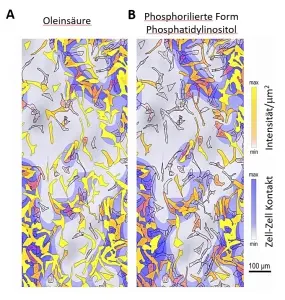Today, many biomedical disciplines focus their attention on the metabolites of individual cells. While in the past these were considered simply as degradation products or else building blocks for the synthesis of complex cellular molecules, it is now known that they also support and determine central cell functions as signaling molecules and thus make an important contribution to maintaining the healthy balance of the body. “Metabolites modulate epigenetics, they regulate the immune system, control inflammation and are thus also involved in carcinogenesis,“ says Mathias Heikenwälder of the German Cancer Research Center (DKFZ). “Therefore, the analysis of metabolite profiles has become the focus of interest in many research disciplines during the last few years.“
It is striking that individual cells in organs or tissues do not have a uniform metabolite profile, but on the contrary often exhibit pronounced heterogeneity in the broad profile of various metabolites and lipids. The individual metabolite profile of a cell also depends on its localization within the organ. In order to assess the condition of an organ or tissue, it is therefore necessary to evaluate the metabolic profile of a large number of individual cells and simultaneously document their localization within the tissue network. With “SpaceM“, the Heidelberg researchers present an innovative method to perform these analyses in high throughput fashion applied to a variety of adherent cells, in particular, liver cells.
The method is based on a combination of fluorescence microscopic images and a special form of mass spectrometry called MALDI-imaging (Matrix Assisted Laser Desorption/Ionization). Using this novel method enabled the Heidelberg researchers to detect more than 100 metabolites from more than a thousand individual cells per hour. In the future, even measurements in the subcellular scale are possible.
To validate the new method, the team studied a population of human liver cells that they stimulated with fatty acids and pro-inflammatory cytokines as an in vitro model of the Non-Alcoholic Fatty Liver Disease and Non-Alcoholic Steatohepatitis , the widespread diseases of the liver. They used SpaceM to obtain metabolite profiles of nearly 30,000 individual cells. A quarter of the cells had a distinctly altered lipid profile that clearly indicated an inflammatory change known as steatosis. When these cells were further stimulated with the pro-inflammatory messenger molecule IL17A, almost the entire population switched to the inflammatory phenotype. The scientists were able to confirm exactly this sequence of changes in the development of inflammatory liver disease in mice using standard measurement methods.
“SpaceM offers novel capacities for spatial single-cell metabolomics. Yet is cost-efficient and uses existing instrumentation,“ says EMBL's Theodore Alexandrov. We anticipate that the method and open-source algorithms will democratize single-cell metabolomics worldwide to answer a variety of pressing biomedical questions.“
Luca Rappez&, Mira Stadler&, Sergio Triana, Rose M. Gathungu, Katja Ovchinnikova, Prasad Phapale, Mathias Heikenwalder* and Theodore Alexandrov*: SpaceM reveals metabolic states of single cells.
Nature Methods 2021, DOI: doi.org/10.1038/s41592-021-01198-0
& co-first authors; *co-last-, co-corresponding authors
